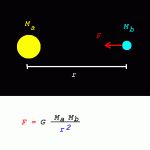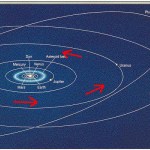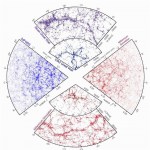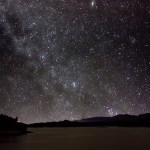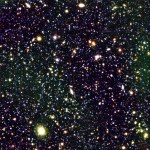gravitation
"I wouldn't know a spacetime continuum or a warp core breach if they got into bed with me." -Patrick Stewart
It's the end of the week once again, and so it's time for another Ask Ethan segment! There have been scores of good questions to choose from that were submitted this month alone (and you can submit yours here), but this week's comes from our reader garbulky, who asks:
Why does gravity decrease the further away you are from the object? I've read that it does decrease with distance squared but not why it does this.
This question seems so simple, and yet the answer -- to the…
"Galileo got it wrong. The Earth does not revolve around the Sun. It revolves around you and has been doing so for decades. At least, this is the model you are using." -Srikumar Rao
It's the end of the week, so that means its time to take on another one of your questions from the question/suggestion box, and continue our ongoing Ask Ethan series! Even though there's a backlog of hundreds of questions, you should keep sending the new ones in, as all questions are fair game for any segment. This week's question comes from reader Brian Mucha, who asks us:
Where did the sun and planets get their…
"On a cosmic scale, our life is insignificant, yet this brief period when we appear in the world is the time in which all meaningful questions arise." -Paul Ricoeur
Ask anyone who's looked up at a dark sky on a clear, moonless night, and you'll immediately hear tales about how incomprehensibly vast the Universe is.
Image credit: Randy Halverson, flickr user dakotalapse, from http://dakotalapse.com/.
But what you're looking at isn't much of the Universe at all. In fact, practically every point of light you see, including the vast swath of stars too dim to individually resolve, comes…
"To disagree leads to study, to study leads to understanding, to understand is to appreciate, to appreciate is to love. So maybe I'll end up loving your theory." -John Wheeler
Out there in the Universe, there's a lot to marvel at. Over billions of years, gravity has attracted different portions of the expanding Universe together into large superclusters and filaments, each made up of clusters, groups, and individual galaxies separated by great cosmic voids.
Image credit: Sloan Digital Sky Survey, 2dF Galaxy Redshift Survey, and Millenium Simulation.
From the observations of this structure…
"Not even light can escape such hollowing, this huge mass in a small space. Even the Milky Way with its open arms is said to have a black hole at its heart." -Susan B.A. Somers-Willett
Our Milky Way is home to us all. With its hundreds of billions of stars, massive spiral arms, dust lanes, and orbiting globular clusters, it's no wonder that nearly everything we see in the night sky is contained within it.
Image credit: All rights reserved by Flickr user Greg Booher.
I say nearly everything, of course, because there are a few exceptions. The Andromeda Galaxy, for one, as well as…
"Nothing exists except atoms and empty space; everything else is just opinion." -Democritus of Abdera
When you take a look out at the Universe, past the objects in our own solar system, beyond the stars, dust and nebulae within our own galaxy, and out into the void of intergalactic space, what is it that you see?
Image credit: BRI composite-image of the FORS Deep Field, ESO, VLT.
What we normally think of as the entire Universe, consisting of hundreds of billions of galaxies, with about 8,700 identified in the tiny patch of deep-sky shown above. Each one of those galaxies, itself…
Two summers ago, I was in Les Houches, France, for a summer school that turned out to be one of the best experiences of my life. Seriously, we'd wake up every day and this was the view from the school:
Well, the University/Institution that ran the school sends periodic updates to me. And they linked me to this release. Here's the interesting and (if it's true) sensational claim that the release makes:
Recently, a team of theorists ... performed a new analysis of all available CMB and LSS data including the WMAP and Sloan data and favor an inflation model where exist primordial gravitational…
